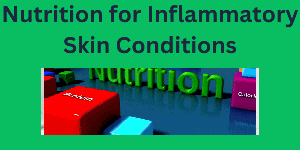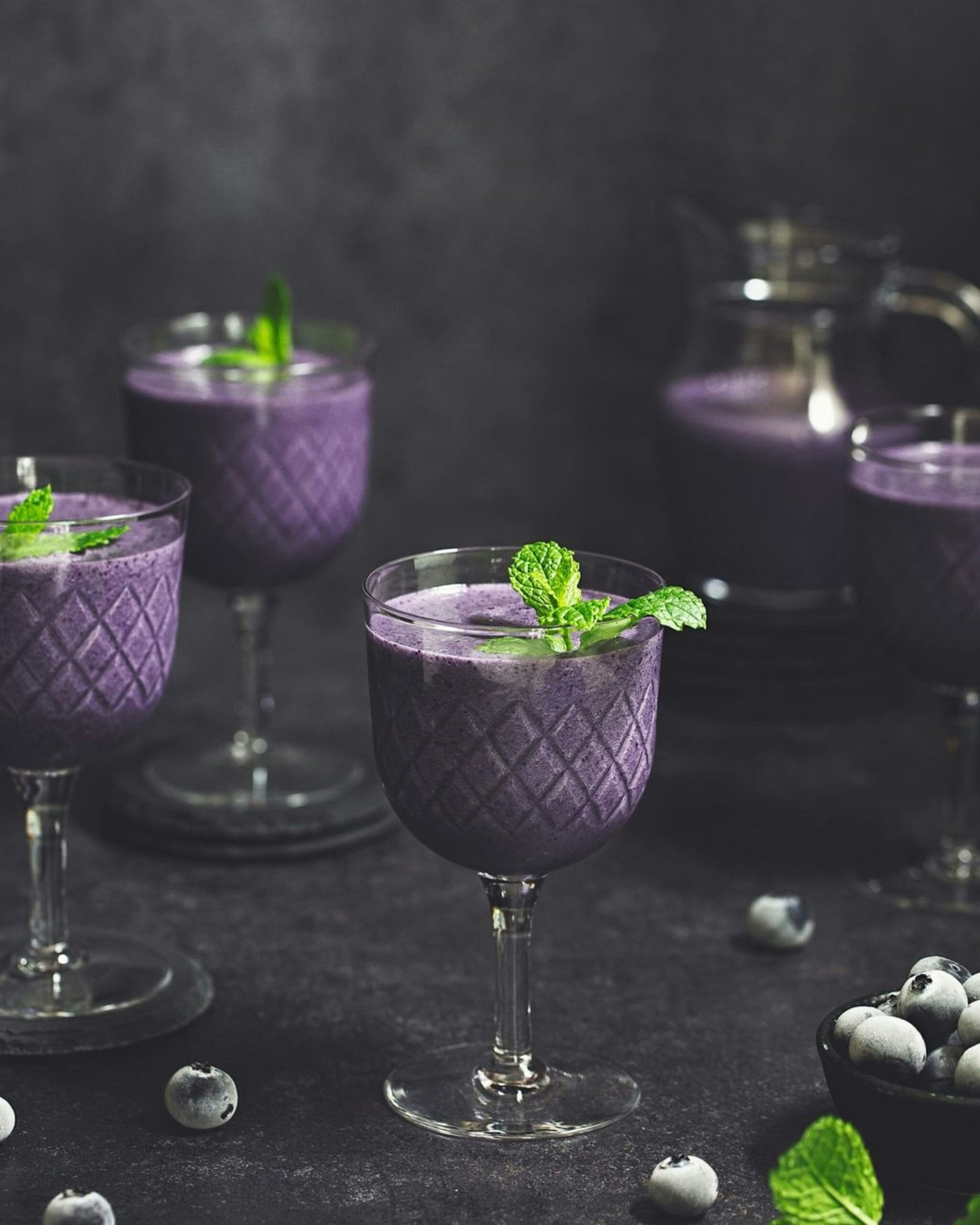
Table of Contents
“You are what you eat” – Nutrition for Inflammatory Skin Conditions
Nutrition for inflammatory skin conditions, such as psoriasis and

Nutritional Foods
Fatty Fish**: Rich in omega-3 fatty acids, fatty fish like salmon, mackerel, and sardines help reduce inflammation and support overall skin health.
Leafy Greens:
Spinach, kale, and Swiss chard are packed with antioxidants and vitamins that can help combat oxidative stress and inflammation.
Berries
Blueberries, strawberries, and raspberries are high in antioxidants that may help protect skin cells from damage and reduce inflammation.
Nuts and Seeds
Walnuts, flaxseeds, and chia seeds are excellent sources of omega-3s and vitamin E, which support skin integrity and reduce inflammatory responses.
Turmeric:
This vibrant spice contains curcumin, known for its anti-inflammatory properties. Incorporating turmeric into your meals can help soothe skin conditions.
Avocado
Rich in healthy fats and vitamin E, avocados promote hydration and nutrient absorption in the skin.
Sweet Potatoes:
High in beta-carotene, sweet potatoes can help promote skin health by providing essential nutrients that support immune function.
Fermented Foods
Foods like yogurt, kimchi, and sauerkraut contain probiotics that may support gut health, which is closely linked to skin health.
Gelatin
Contains glycine that builds collagen helping gut inflammation and skin
Oatmeal
Eating oatmeal can help improve inflamed skin! Oatmeal is rich in antioxidants and anti-inflammatory compounds like avenanthramides, which can help reduce skin irritation and inflammation. Additionally, oatmeal contains beta-glucan, a type of soluble fiber that helps maintain skin hydration and supports the skin barrier.
Including oatmeal in your diet can provide these benefits internally, while using oatmeal-based products topically can also soothe and protect the skin
The Anti-Inflammatory Diet
An anti-inflammatory diet focuses on consuming foods that help reduce inflammation in the body, which can be beneficial for managing chronic conditions like arthritis, heart disease, and even certain skin conditions. Here’s a brief overview:
Foods to Include:
Fruits and Vegetables: Especially those rich in antioxidants, like berries, leafy greens, and cruciferous vegetables (e.g., broccoli, kale).
Healthy Fats: Olive oil, avocados, and nuts.
Fatty Fish: Salmon, sardines, and mackerel, fish high in omega-3 fatty acids.
Whole Grains: Oats, brown rice, and quinoa.
Spices: Turmeric, ginger, and cinnamon have anti-inflammatory properties.
Beverages: Green tea and moderate intake of red wine (due to resveratrol).
Foods to Avoid:
Processed Foods: Such as chips, cookies, and other packaged snacks.
Refined Carbs: White bread, pasta, and pastries.
Sugary Beverages: Soda and fruit juices with added sugars.
Red and Processed Meats: Like hot dogs, sausages, and bacon.
Trans Fats: Found in many fried foods and baked goods.
Sugar!
Benefits:
Reduced Inflammation: Helps manage symptoms of chronic inflammatory conditions.
Improved Heart Health: Lowers the risk of heart disease.
Better Digestive Health: Supports a healthy gut microbiome.
Enhanced Skin Health: Can help reduce skin inflammation and improve overall skin condition.

Sample Menu:
Breakfast: Oatmeal topped with berries and a sprinkle of cinnamon.
Lunch: Quinoa salad with mixed greens, cherry tomatoes, avocado, and a drizzle of olive oil.
Dinner: Grilled salmon with a side of steamed broccoli and sweet potatoes.
Snacks: A handful of almonds or an apple with a bit of almond butter.
Following an anti-inflammatory diet can be a great way to support overall health and manage skin inflammation.
Gluten-Free Diet
A gluten-free diet might help improve inflamed skin, but it largely depends on whether you have celiac disease or gluten sensitivity. For individuals with these conditions, eliminating gluten can reduce inflammation and improve skin conditions like
It’s always a good idea to consult with a healthcare professional before making major dietary changes, especially to ensure you’re not missing out on essential nutrients.
Supplements for Inflammatory Skin Conditions
Curcumin: Found in turmeric, it has strong anti-inflammatory properties1.
Fish Oil Rich in omega-3 fatty acids, it helps reduce inflammation.
Ginger: Contains compounds that reduce inflammation.
Resveratrol: An antioxidant found in grapes that reduces inflammation.
Spirulina: A type of blue-green algae with anti-inflammatory properties.
Bromelain: An enzyme found in pineapples that reduces inflammation.
Green Tea Extract: Contains antioxidants that reduce inflammation.
Garlic: Has anti-inflammatory and antioxidant properties.
N-Acetyl Cysteine (NAC): Supports glutathione production and reduces inflammation2.
Glutathione: A powerful antioxidant that reduces inflammation.
Biotin: Often recommended for skin health, biotin supports the metabolism of fats and proteins essential for maintaining healthy skin.
Collagen Peptides: Collagen supports skin elasticity and hydration; supplementation may benefit those struggling with dryness or inflammation.
Vitamins:
Vitamin A: Promotes skin repair and reduces inflammation. Cod liver oil is a great source
Vitamin C: An antioxidant that helps reduce oxidative stress and inflammation. Get C daily
Vitamin D: Modulates the immune system and reduces inflammation. Sun works wonders!
Vitamin E: Protects skin cells from oxidative damage and reduces inflammation.
Vitamin K: Helps with wound healing and reduces skin inflammation.
Minerals:
Zinc: Essential for skin healing and reducing inflammation.
Selenium: An antioxidant that helps reduce inflammation.
Magnesium: Helps reduce chronic inflammation and supports skin health. Super important!
Amino Acids:
Glutamine: Supports skin repair and reduces inflammation.
Glycine: Promotes collagen production and reduces inflammation.
Arginine: Enhances wound healing and reduces inflammation.
Proline: Supports collagen formation and reduces inflammation.
Additional Tips:
Hydration: Drinking plenty of water helps keep the skin hydrated and reduces inflammation. Make sure to drink only purified water. No tap water unless it comes from a pure source which is unlikely.
Avoid Triggers: Identifying and avoiding foods or substances that trigger inflammation can be beneficial.
Incorporating these vitamins, minerals, amino acids, and supplements into your diet can help manage and reduce skin inflammation.
Conclusion
While dietary changes are not a replacement for medical treatment for autoimmune skin disorders, incorporating these nutritional foods and supplements can provide additional support for managing inflammation and promoting overall skin health. Always consult with a healthcare professional before making significant dietary changes or starting new supplements to ensure they align with your individual health needs. By embracing these natural solutions, you can take proactive steps toward healthier skin from the inside out!





